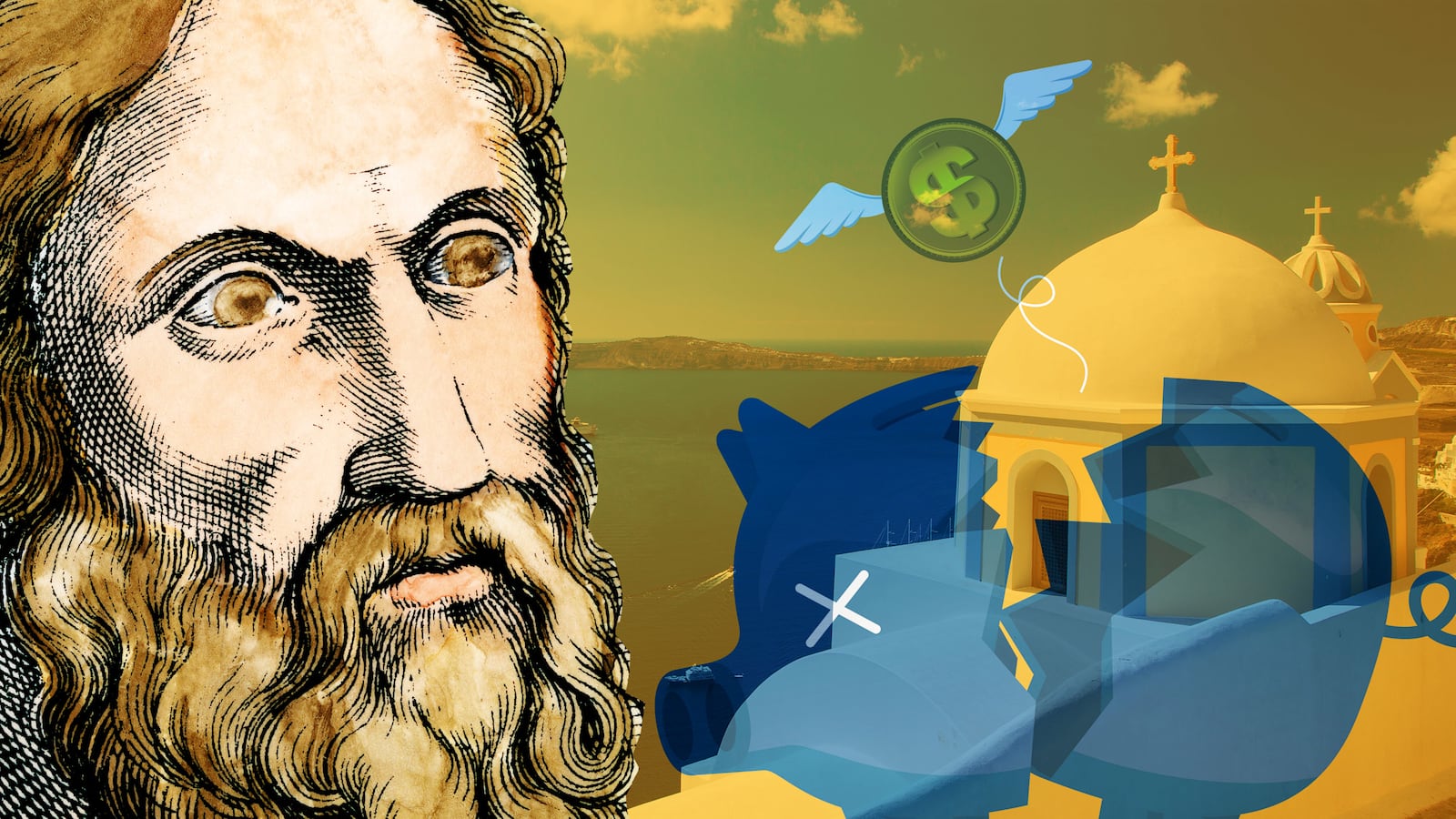ATHENS — In a neighborhood of shuttered shops and crumbling 19th century buildings less than a mile from the Acropolis, someone has scrawled a graffito on the side of a downtown building here: “No Public Toilets, Mr. Mayor!” Most of the nearby graffiti—the words “Sold Out” beneath a drooping-eyed beggar, the advice “Kill Them All” in blocky red letters—simmers with rage or despair. But this message to the mayor is unique in its multi-sensory assault. Just beneath it on the sidewalk is a three-dimensional illustration of the lack of public toilets: a heap of human shit.
This squalid little tableau on Aristophanes Street, named for the great comic playwright of classical Athens, is one of many visible signs of urban disintegration surrounding Omonoia square. Whole blocks appear largely abandoned, the streets strewn with trash and the buildings sprayed with ugly, hate-poisoned graffiti. Metal grates and deadbolts secure the few remaining businesses, but commerce and legal habitation have essentially vanished in some areas. On a recent weekday afternoon two men on Aristophanes Street rummaged through an overflowing dumpster for glass bottles. A man sat behind them on the sidewalk, guiding a needle into a vein on his arm.
There is a certain historical irony to the fact that Omonoia is the epicenter of Athens’ civic deterioration. A key term in Aristotle’s Politics, “Omonoia” means “together-minded” and is often translated as “concord,” or even more loosely as “political friendship.” It’s a force that binds the citizens of a city together through shared values that promote human flourishing. Athens, like many cities around the world, conspicuously fails to manifest this Aristotelian ideal, coming much closer to the state of class warfare that Plato’s Socrates describes in the Republic. If distribution of wealth is too unequal, Socrates says, what is ostensibly a single city will in fact be “two cities at war with one another, that of the rich and that of the poor.”
Aristophanes, with his love of jokes about sex and farts, might seem to be the ancient author least likely to offer insight into the relations between wealth, ethics, and political unity. Yet his play Wealth, first produced in 388 B.C. when he was nearly 60, is a comic meditation on precisely these themes. After the devastation of the Peloponnesian War and the Corinthian War, Athens was a fallen power, its political sway and economic might greatly reduced. The parallel to contemporary Greece was seemingly strong enough to motivate this summer’s production of the play at outdoor theaters from Epidaurus to Olympia. In some of these adaptations, the character playing the goddess Poverty was costumed to suggest the German Chancellor Angela Merkel, a strong proponent of the austerity measures that have been alternately criticized for hobbling the Greek economy and praised for limiting the Greek government’s riotous and wasteful spending.
The title character of Aristophanes’s play is the god Wealth, a wrinkled, bald, and toothless old man, unwashed and hunched with age. But his most important feature is blindness, which leads him to indiscriminately visit the good and bad alike. Thus many corrupt and wicked people become rich, while many virtuous and good ones remain poor. The play begins, in short, with the world as we know it—a place where people like Donald Trump can thrive. But after chancing upon Wealth, an old farmer takes the god to the healing sanctuary of Asclepius in order to cure his blindness. With his sight restored, Wealth can now bestow his blessings on the deserving. The play appears to end with the correction of a basic moral flaw in the world—in the future virtuous people will finally enjoy prosperity as their just reward.
But a disquieting possibility disturbs this fairytale ending: what if wealth actually corrodes the virtue it is supposed to reward? This argument is advanced by the goddess Poverty, who claims that without her motivating presence people wouldn’t produce anything. “Every craftsman feels that he is my slave,” she says, “I sit beside him, compelling him by sheer need to seek a way of earning a livelihood.” Without her, tailors, brick makers, shipbuilders, cobblers, and tanners will all cease working. Worst yet, slaves won’t be able to fill the labor vacuum because there will be no slaves. Anyone who might consider selling a slave will already have enough money and thus lack the incentive to do so. To those who want to reward good people with wealth, Poverty responds that they are good only because they lack it.
Work ethic is not the only virtue that Poverty says Wealth will destroy. “I give you better men than wealth ever can, better in body and better in mind,” she says. “He gives you all sorts of cripples: gout here, potbellies there, dropsy in the calves, obesity beyond all bounds, while I give you lean, wiry, wasp-like men, deadly to their enemies.” In short, Wealth makes fat and cowardly invalids.
In such radical form, her argument is not hard to counter. Extreme poverty, as one character observes, produces suffering and misery, not virtue. It also drives men to “thieving and burglary.” Poverty’s reply is one of the play’s most fascinating passages. She accepts the legitimacy of these points, but distinguishes between poverty and pauperism. “The man who walks in my ways never has suffered and never will suffer the privations you speak of. You were talking about a pauper, who has absolutely nothing to live on. Poverty is quite different. It means living a thrifty life, sticking to your job, not having anything to spare, but not having to go short either.” In today’s terms, she’s essentially arguing for the necessity of a robust middle class.
Since the Greek economy nearly imploded last year, analysis of the collapse has clustered around two explanations. One account, filtered to varying degrees through the language of economics, stresses some essential Mediterranean languor deep in the Greek soul. This aversion to work, apparently unshared by the virtuous countries of northern Europe, made the crisis both inevitable and deserved. Austerity is thus a necessary incentive to stimulate Greek productivity. The argument has a strong affinity to the claim of Aristophanes’s goddess Poverty—that she inspires virtue and diligence in those she touches.
The second account paints Greece as an innocent, hard-working victim of German and European predation and claims the crisis is just the latest chapter in a long story of strong countries extracting wealth from weaker ones. Austerity unfairly punishes the just and deserving. This argument shares the yearning of Aristophanes’s characters who restore sight to the god Wealth. If the world was fair, the poor, virtuous Greeks would be rewarded with wealth.
But what exactly does a virtuous person do with wealth? To hoard it or flaunt it risks compromising the very goodness that wealth rewards. Lest we miss the implied conclusion, Aristophanes makes things perfectly obvious in a scene featuring a character simply named “Good Man.” Good Man promptly gives away his money to friends who need it.
There’s an enduring paradox at the heart of this play that remains deeply relevant: those who deserve wealth by definition tend not to care much about having it. And those who have it risk becoming the sort of people who don’t deserve it. Whether the figures debating these issues are the allegorical gods of an ancient drama, the political leaders of Greece and Germany, or the presidential candidates of modern American politics, Aristophanes’s wise comedy illuminates both the dangers of wealth without virtue and the promise of a middle class that is neither corrupted by excess nor pained by indigence.






